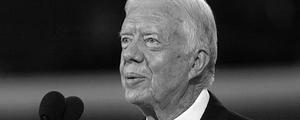PRINCETON, NJ -- Gallup Poll Daily tracking during President Obama's first 100 days in office finds broad support for him among Americans affiliated with most major U.S. religions. U.S. Muslims and Jews give Obama his highest job approval ratings, at 85% and 79%, respectively. He also receives solid majority support from Roman Catholics (67%) and Protestants (58%), and more approval than disapproval from Mormons.
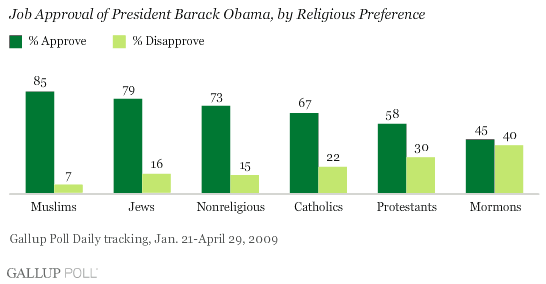
Obama also enjoys broad support -- 73% approval -- from the sizable group of Americans with no religious affiliation, including those calling themselves atheists or agnostics.
These findings are based on large sample sizes for each religious group contained in the combined Gallup Poll Daily tracking results from Jan. 21-April 29, 2009. This includes interviews with approximately 55,000 Protestants (defined in this study as those who identify themselves either as Protestant or with another non-Catholic Christian religion), 24,000 Catholics, 2,500 Jews, 1,600 Mormons, and 350 Muslims. (Full details of the methodology are provided at the end of this report.)
Catholics Broadly Supportive of Obama
The University of Notre Dame's recent invitation to Obama to deliver its 2009 commencement address -- and the associated decision to confer an honorary doctorate degree on him -- has sparked outrage, protests, and boycotts against the university among some Catholics and Catholic bishops. The critics of that invitation say the university's acts implicitly condone Obama's more liberal positions on abortion and embryonic stem-cell research -- issues of significant disagreement between the Roman Catholic Church and the new president. However, the controversy would seem not to resonate with rank-and-file Catholics, most of whom approve of Obama's job performance to date (and who don't necessarily concur with the church on the relevant policy issues).
Obama's job approval ratings among Catholics and Protestants have varied slightly from week to week since his inauguration, dipping a bit in February and March, but are about the same today as they were in January.
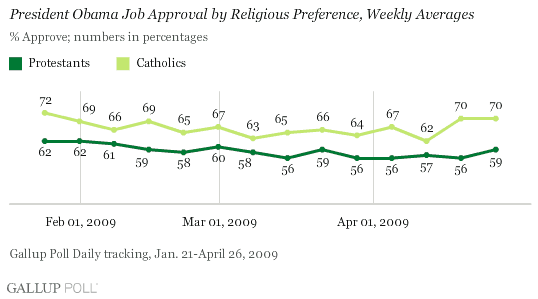
The trend is the same among weekly churchgoing Catholics.
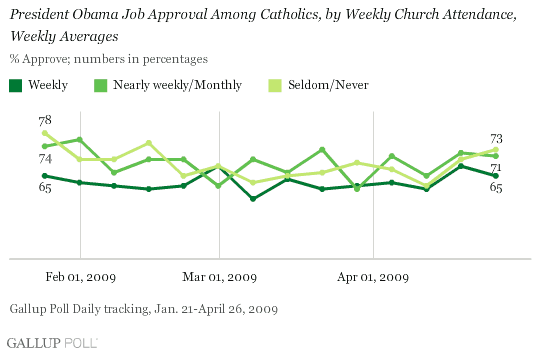
Even Catholics who consider themselves "conservative" politically are more likely to approve than disapprove of Obama's job performance. This distinguishes Catholics from Protestants, as conservative Protestants are more likely to disapprove. More generally, liberals and moderates among both Christian groups express far more widespread approval of Obama than do conservatives.
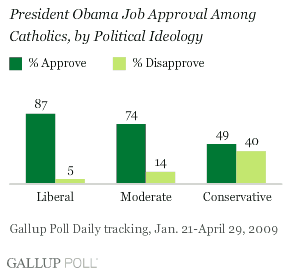
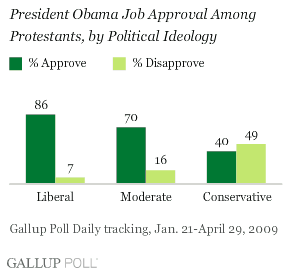
In fact, 53% of Catholics voted for Obama for president in November, almost identical to the 52.9% of the popular vote Obama won in the 2008 election. Catholics' 67% approval of Obama in his first 100 days is slightly higher than his overall 63% average approval rating for the same period. Thus, relative to the population, Catholics have become a bit more supportive of Obama as president than they were in the election.
Protestants' 58% average approval rating of Obama for the first 100 days lags behind the 63% national average, just as their 47% support in the election lagged behind Obama's overall support.
Both in the election and now, Jewish and nonreligious Americans' support for Obama has registered way above average. No Gallup or exit-poll data on Muslims or Mormons is available to make the same comparison.
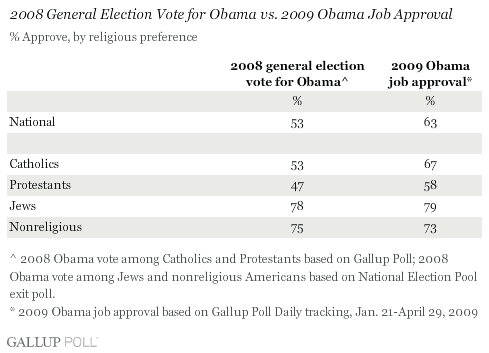
Muslims and Jews United for Obama
The commonality between U.S. Jews and Muslims in their broad approval of Obama is notable given the global friction between Jews and Muslims with respect to Mideast politics.
High U.S. Jewish support for Obama is not surprising given that Jews are traditionally heavily Democratic in their political orientation. Democratic Jews supported Hillary Clinton by a slight margin over Obama in the battle for the Democratic nomination last year, but they gradually came around to supporting him in large numbers for the general election.
Obama signaled he will be aggressive in seeking an end to the Israeli-Palestinian conflict by appointing a special envoy for Middle East peace, and by directing Secretary of State Hillary Clinton to actively pursue a two-state solution to the conflict. It is not clear whether U.S. Jews endorse Obama's approach, but the fact that four in five approve of the job he is doing -- consistent with their vote for him in the election -- suggests they at least tolerate it.
Obama is rated far less well by Jewish conservatives than he is by moderate and liberal Jews -- similar to the pattern seen with Catholics and Protestants. However, a much smaller proportion of Jews are conservative (20%) than is true for either Catholics (38%) or Protestants (45%).
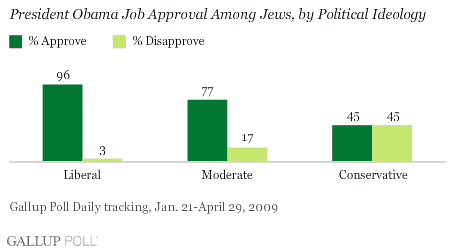
Bottom Line
Obama's first 100 days have been successful by just about every public-opinion gauge. More than 6 in 10 Americans say he has met or exceeded their expectations, and a majority of every demographic subgroup of the population -- aside from Republicans and conservatives -- approves of the job he is doing.
Although Obama has dusted up some controversy among conservative Catholics and has stepped into the always-thorny Mideast political fray, his image thus far among Catholics seems untarnished, and his image among Jews, Muslims, and nonreligious Americans is extraordinarily positive. Protestants and Mormons are more conservative in their politics than members of other religions, and thus more moderate in their approval of Obama. But even among these groups, more approve of his job performance than disapprove.
Survey Methods
Results are based on telephone interviews with 99,494 national adults, aged 18 and older, conducted Jan. 21-April 29, 2009, as part of Gallup Poll Daily tracking. For results based on the total sample of national adults, one can say with 95% confidence that the maximum margin of sampling error is ±0.5 percentage points.
For results based on religious subgroups, the sample sizes and associated margins of error are shown in the accompanying table.
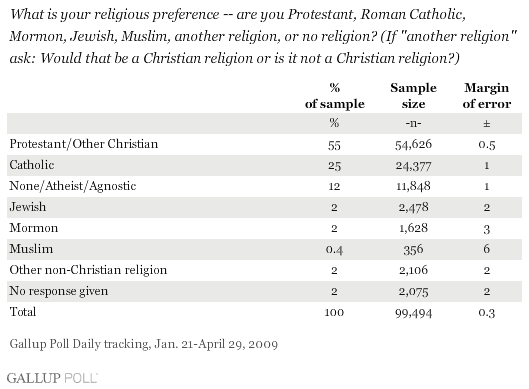
Interviews are conducted with respondents on land-line telephones (for respondents with a land-line telephone) and cellular phones (for respondents who are cell-phone only).
In addition to sampling error, question wording and practical difficulties in conducting surveys can introduce error or bias into the findings of public opinion polls.
